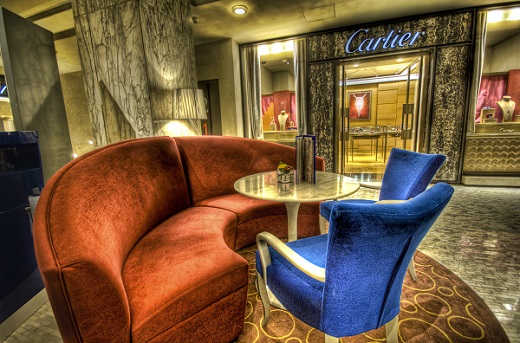Jewelry Sales Support Richemont in Tough Year
 RAPAPORT... Jewelry sales at Richemont grew 3% for the full fiscal year as double-digit increases in Asia Pacific, the Middle East and Africa outweighed a lackluster performance in other regions.Proceeds from the category rose to EUR 7.46 billion ($9.08 billion) for the 12 months ending March 31, Richemont said last week. The increase was driven by solid sales of the company's Cartier, Van Cleef & Arpels, and Buccellati brands in the second half of year, when stores reopened following a lockdown period. Online sales of jewelry saw a triple-digit rise for the year, Richemont noted. Operating profit for the jewelry division grew 11% to EUR 2.31 billion ($2.81 billion)."Overall, jewelry sales grew vigorously," the retailer said. "Performance was driven by...Asia Pacific, the Middle East and Africa." Sales in the watch division fell 21% to EUR 2.25 billion ($2.74 billion) for the year as a slump in the first half due to the coronavirus pandemic overshadowed an improvement in the second half. Sales in mainland China grew by triple digits, Richemont noted, while the opening of new stores on the Alibaba Tmall Luxury Pavilion led to a triple-digit increase in online sales for the category.Group profit rose 38% to EUR 1.29 billion ($1.59 billion), even as sales slipped 8% to EUR 13.14 billion ($16.01 billion). A EUR 294 million ($358.1 million) reversal of foreign-exchange losses and a EUR 255 million ($310.6 million) improvement in the value of the company's financial investments were primarily responsible for the profit increase.Group sales for the fourth quarter ending March 31 soared 30% compared to the previous year. Richemont did not disclose fourth-quarter data for jewelry and watches, which together form the company's largest revenue source.Richemont has not given an outlook for the coming fiscal year, noting that there is still uncertainty caused by the pandemic."Although the pace of vaccination has gathered momentum, volatility and low visibility are likely to prevail until there is herd immunity," the company noted. "There are still concerning Covid-19 developments in parts of the world that could slow down a global recovery, even though underlying demand seems strong, with supportive central-bank actions, substantial government stimulus packages, and real estate and stock markets at all-time highs. We will need to learn how to live with the virus probably for much longer than we had hoped."Image: A Cartier store in Shanghai, China. (Flickr)
RAPAPORT... Jewelry sales at Richemont grew 3% for the full fiscal year as double-digit increases in Asia Pacific, the Middle East and Africa outweighed a lackluster performance in other regions.Proceeds from the category rose to EUR 7.46 billion ($9.08 billion) for the 12 months ending March 31, Richemont said last week. The increase was driven by solid sales of the company's Cartier, Van Cleef & Arpels, and Buccellati brands in the second half of year, when stores reopened following a lockdown period. Online sales of jewelry saw a triple-digit rise for the year, Richemont noted. Operating profit for the jewelry division grew 11% to EUR 2.31 billion ($2.81 billion)."Overall, jewelry sales grew vigorously," the retailer said. "Performance was driven by...Asia Pacific, the Middle East and Africa." Sales in the watch division fell 21% to EUR 2.25 billion ($2.74 billion) for the year as a slump in the first half due to the coronavirus pandemic overshadowed an improvement in the second half. Sales in mainland China grew by triple digits, Richemont noted, while the opening of new stores on the Alibaba Tmall Luxury Pavilion led to a triple-digit increase in online sales for the category.Group profit rose 38% to EUR 1.29 billion ($1.59 billion), even as sales slipped 8% to EUR 13.14 billion ($16.01 billion). A EUR 294 million ($358.1 million) reversal of foreign-exchange losses and a EUR 255 million ($310.6 million) improvement in the value of the company's financial investments were primarily responsible for the profit increase.Group sales for the fourth quarter ending March 31 soared 30% compared to the previous year. Richemont did not disclose fourth-quarter data for jewelry and watches, which together form the company's largest revenue source.Richemont has not given an outlook for the coming fiscal year, noting that there is still uncertainty caused by the pandemic."Although the pace of vaccination has gathered momentum, volatility and low visibility are likely to prevail until there is herd immunity," the company noted. "There are still concerning Covid-19 developments in parts of the world that could slow down a global recovery, even though underlying demand seems strong, with supportive central-bank actions, substantial government stimulus packages, and real estate and stock markets at all-time highs. We will need to learn how to live with the virus probably for much longer than we had hoped."Image: A Cartier store in Shanghai, China. (Flickr)